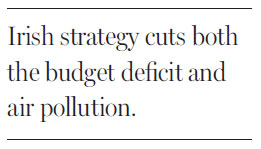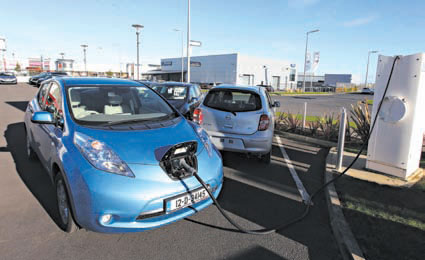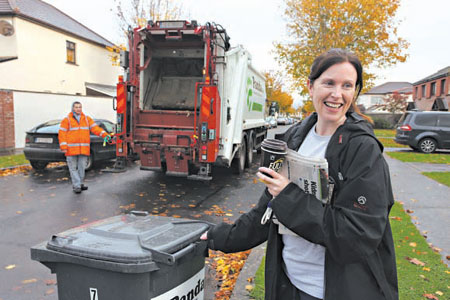Taxes making Ireland greener
Updated: 2013-01-06 11:57
By Elisabeth Rosenthal(The New York Times)
|
|||||||
|
An environmental tax made the Irish quickly shift to greener fuels and to cars like this Nissan electric model. Derek Speirs for The New York Times |
|
Ireland's taxes on garbage are based on weight at collection. Derek Speirs for The New York Times |

DUBLIN - Over the last three years, with its economy in tatters, Ireland embraced a novel strategy to help reduce its staggering deficit: charging households and businesses for the environmental damage they cause.
The government imposed taxes on most of the fossil fuels used by homes, offices, vehicles and farms, based on each fuel's carbon dioxide emissions, a move that immediately drove up prices for oil, natural gas and kerosene. Household trash is weighed at the curb, and residents are billed for anything that is not being recycled.
The Irish now pay purchase taxes on new cars and yearly registration fees that rise steeply in proportion to the vehicle's emissions.
Environmentally and economically, the new taxes have delivered results. Long one of Europe's highest per-capita producers of greenhouse gases, with levels nearing those of the United States, Ireland has seen its emissions drop more than 15 percent since 2008.
Although much of that decline can be attributed to a recession, changes in behavior also played a major role, experts say, noting that the country's emissions dropped 6.7 percent in 2011 even as the economy grew slightly.
"We are not saints like those Scandinavians - we were lapping up fossil fuels, buying bigger cars and homes, very American," said Eamon Ryan, who was Ireland's energy minister from 2007 to 2011. "We just set up a price signal that raised significant revenue and changed behavior. Now, we're smashing through the environmental targets we set for ourselves."
When the Irish were faced with new environmental taxes, they quickly shifted to greener fuels and cars and began recycling with fervor. Automakers like Mercedes found ways to make powerful cars with an emissions rating as low as tinier Nissans. With less trash, landfills closed. And as fossil fuels became more costly, renewable energy sources became more competitive, allowing Ireland's wind power industry to thrive.
Even more significantly, revenue from environmental taxes has played a crucial role in helping Ireland reduce a daunting deficit by several billion euros each year.
The three-year-old carbon tax has raised nearly one billion euros over all, including 400 million euros in 2012. That provided the Irish government with 25 percent of the 1.6 billion euros in new tax revenue it needed to narrow its budget gap this year.
The International Monetary Fund, which oversees the rescue plan, recently suggested that Ireland should "expand the well-designed carbon tax" and its automobile taxes to generate even more money. Although first proposed by the Green Party, the environmental taxes enjoy the support of all major political parties "because it puts a lot of money on the table," said Frank Convery, an economist at University College Dublin.
Not everyone is happy. The prices of basic commodities like gasoline and heating oil have risen 5 to 10 percent. This is particularly hard on the poor, although the government has provided subsidies for low-income families to better insulate homes, for example. And industries complain that the higher prices have made it harder for them to compete outside Ireland.
"Prices just keep going up, and a lot of people think it's a scam," said Imelda Lyons, 45, as she filled her car at a gas station here. "You call it a carbon tax, but what good is being done with it to help the environment?"
Although carbon taxes in some ways disproportionately affect the poor - who are less able to buy new, more efficient cars, for example - such taxes do heavily penalize the wealthy, who consume far more. As with "sin taxes" on cigarettes, the taxes also alleviate some of the societal costs of pollution.
For several years, the European Commission has encouraged debt-ridden members of the European Union to embrace environmental taxes, saying that its economists have concluded they have "a less detrimental macroeconomic impact" than new income taxes or corporate taxes.
"Europeans don't like taxes either," said Connie Hedegaard, the European commissioner for climate action. "But this is good for the environment, and also good for our competitiveness."
Some of Europe's strongest economies, like Sweden, Denmark and the Netherlands, have taxed carbon dioxide emissions since the early 1990s, and Japan and Australia have introduced them more recently.
In Ireland, the carbon tax is levied on fossil fuels when they enter the country and is then passed on to consumers at the point of purchase. The automobile sales tax, which ranges from 14 to 36 percent of a car's market price depending on its emissions, is simply folded into the sticker price. That sent manufacturers racing to reduce emissions.
Automakers like Mercedes and Volvo began making cars with high-efficiency diesel engines that shut off rather than idle when they stop, for example. "For manufacturers it's all, 'How low you can get?' " said Donal Duggan, a brand manager at an MSL showroom near central Dublin.
Other emissions taxes on cars, including the annual car registration fee, or road tax, are billed directly to customers, potentially adding thousands to annual operating costs. Ninety percent of new car sales last year were in the two lowest-emission tiers.
The taxes on garbage had an immediate impact. In Dun Laoghaire Rathdown County in southeastern Dublin, each home's "black bin" for garbage headed to the landfill is weighed at pickup to calculate quarterly charges. Green bins for recyclables are emptied free of charge.
"There was a big furor initially, but now everything I throw out, I think, 'How could I recycle this?' " said Tara Brown.
Of course, new environmental taxes bring new pain. Gas, always expensive in Europe, sells here for about $2 per liter, around 20 percent more than in 2009 because of tightening market supplies and the new tax.
Still, Dr. Convery is encouraging the government to raise carbon tax rates for 2013, declaring, "You don't want to waste a good crisis to do what we should be doing anyway."
The New York Times
(China Daily 01/06/2013 page9)

